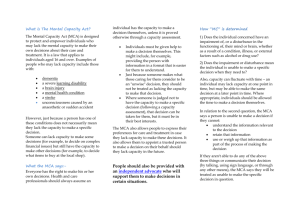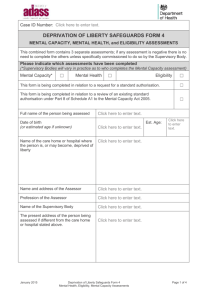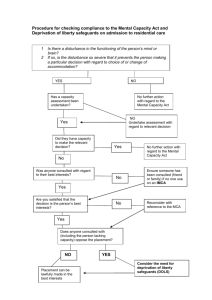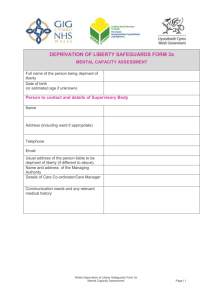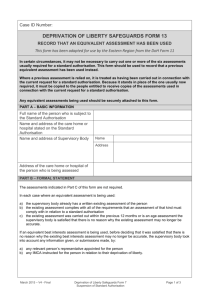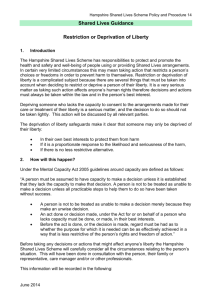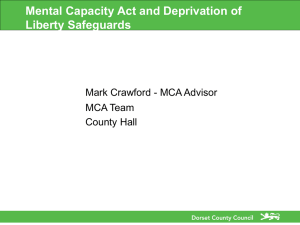Deprivation of Liberty
advertisement
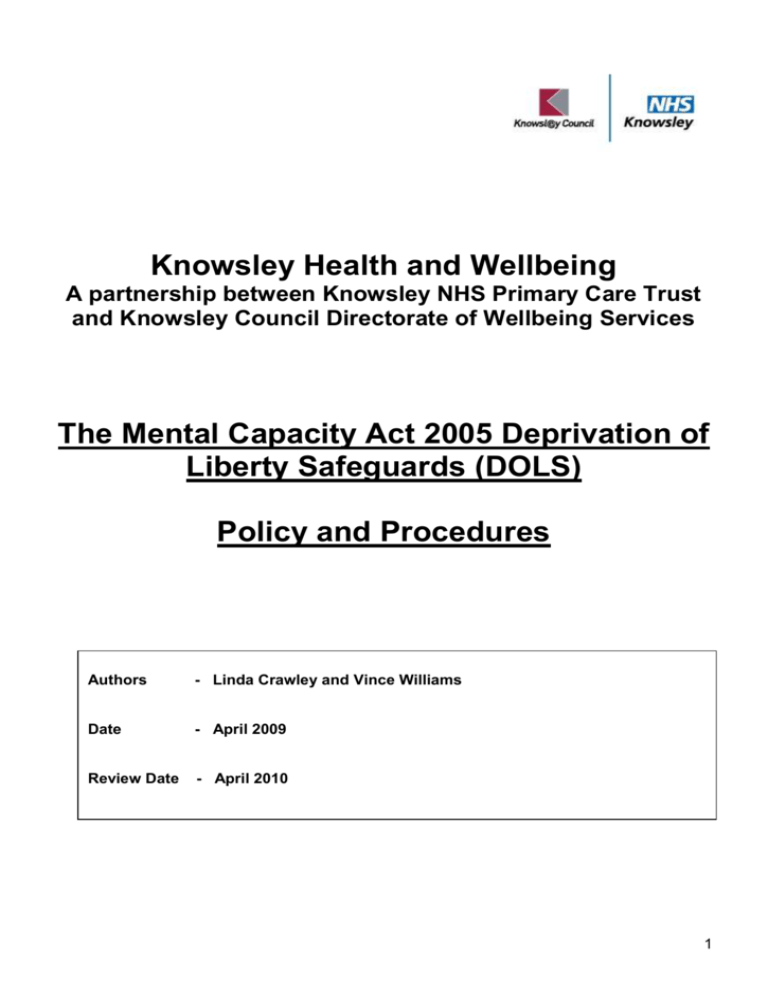
Knowsley Health and Wellbeing A partnership between Knowsley NHS Primary Care Trust and Knowsley Council Directorate of Wellbeing Services The Mental Capacity Act 2005 Deprivation of Liberty Safeguards (DOLS) Policy and Procedures Authors - Linda Crawley and Vince Williams Date - April 2009 Review Date - April 2010 1 Contents Policy Control Information ……………………… Page 3 Introduction ……………………… Page 5 Definitions/Glossary ……………………… Page 6 Principles and Process ……………………… Page 7 Further Information ……………………… Page 10 Appendix (1) DOLS Overview ……………………… Page 12 Appendix (2) 3rd Party Letter ……………………… Page 13 ………………... Page 14 Appendix (4) DOLS checklist ……………………… Page 15 Appendix (3) IMCA referral form 2 POLICY DOCUMENT CONTROL PAGE TITLE Title: Mental Capacity Act Deprivation of Liberty Safeguards Policy and Procedures Version: 1 Date: April 2009 HCC STANDARDS LINK QUALITY CONTROL REVIEW PROFESSIONAL GROUP APPROVAL ORIGINATOR SUPERSEDES Reference Number: Supersedes: N/A Description of Amendments: Originated by: Linda Crawley Designation: Head of Modernisation and Improvement Department / Service: Health and Wellbeing Referred for approval by: Linda Crawley Referred to (insert name of group/s): Mental Capacity Act Local Implementation Network Date of Referral: 26th March 2009 Approved by: Date: Executive Signature: Review Date: April 2010 Responsibility of: Linda Crawley Date sent to Clinical Governance: April 2009 Quality Control Check Completed: Link to HCC Standards Reference: Legislative framework to protect the interests of people who lack the mental capacity to consent to care/treatment. Part of the responsibility for safeguarding adults monitored by the Care Quality Commission 3 POLICY CONTROL PAGE (2) Continued Training Programme/awareness raising required to fully implement policy: Yes x No N/A. If N/A please state why: Training and awareness raising programme is ongoing. Staff across PCT/DWS and partner agencies have attended events plus e learning packages are available for independent study. Training/ Awareness Raising to take place on: Mental Capacity Act and Deprivation of Liberty Safeguards Date: various Provided by: MCA/DOLS LEAD – Vince Williams The Policy will be posted on Knowsley Council and NHS Knowsley intranet & internet: Date: April 2009 Electronic or Hard Copy Circulation List: Policy will be circulated by both electronic and hard copy 4 Knowsley Health and Wellbeing Mental Capacity Act 2005 Deprivation of Liberty Safeguards (DOLS) Policy and Procedure 1. INTRODUCTION The Mental Capacity Act 2005 Deprivation of Liberty Safeguards (MCA DOLS) provide a legal framework to prevent unlawful deprivation of liberty occurring. They protect vulnerable people aged 18 or over when receiving care and/or treatment in a registered hospital or care home and who lack the capacity to consent but may need to be deprived of their liberty in their own best interests to protect them from harm. It is important to understand that the MCA DOLS are not about detention or compulsory treatment under the Mental Health Act 1983. The 1983 Act is primarily about people who are diagnosed as having a mental health problem and who need to be detained or treated for their own well-being or to protect other people. The majority of people who will require the protection of the MCA DOLS are those with more severe learning disabilities, older people with the range of dementias or people with neurological conditions such as brain injuries. NHS Knowsley and Knowsley Council are responsible for administering the MCA DOLS at a local level and are defined as supervisory bodies. This guidance is written so that staff working for a supervisory body understand their legal responsibilities. It should be read in conjunction with Knowsley’s own policy and procedures for the Mental Capacity Act 2005 and Safeguarding Vulnerable Adults. Managers working in hospitals and care homes and people appointed as relevant person’s representatives will have other roles and responsibilities under the new DOLS system which comes into force on 1 April, 2009. 2. THE CODE OF PRACTICE The Deprivation of Liberty Code of Practice has statutory force and practitioners need to demonstrate that they follow this recording all assessments and decisions made on behalf of any incapacitated adult. This Guidance is based on but not intended to replace the legal framework in Schedule A1 of the Mental Capacity Act 2005 and the accompanying MCA DOLS Code of Practice. This can be downloaded at: www.dh.gov.uk/en/Publicationsandstatistics/Publications/PublicationsPolicyAndGuidance /DH_085476. Reference to the relevant paragraphs in the Code is made in brackets. 3. TRAINING Knowsley Health and Wellbeing Workforce Development prospectus has details of further specialist training on the Mental Capacity Act. This will be of particular interest to those who may be expected to make decisions on behalf of any incapacitated adult. The Safeguarding Adults Unit can also arrange access to e-learning packages that cover, separately: Mental Capacity Act 2005, Safeguarding Adults and Deprivation of Liberty Safeguards by contacting 0151 443 3345. 5 4. IMPORTANT DEFINITIONS Key terms used in the MCA DOLS legislation include: Supervisory body refers to Primary Care Trusts (for hospitals) and Local Authorities (for care homes) Managing authority is the person or body with management responsibility for the hospital or care home in which a person is being, or may be, deprived of liberty Standard authorisation permits lawful deprivation of liberty and is issued by a supervisory body Urgent authorisation permits lawful deprivation of liberty and is issued by a managing authority for a short temporary period – usually up to seven days. A simultaneous application for a standard authorisation must be made to the supervisory body in any urgent authorisation Relevant person is the person (aged18 years and over) who may need to be deprived of liberty. Relevant person’s representative is the person who represents the relevant person which may be a family member, friend, or, where none is available, a paid representative. The paid representative will be appointed by the supervisory body and is likely to be an advocate or an IMCA. The representative has important duties and rights see chapter 7 DOLS Code of Practice Best interests assessor is the person who assesses whether or not deprivation of liberty is in the person’s best interests, is necessary to prevent harm to the person and is a proportionate response to the likelihood and seriousness of that harm Advance decision (ADRT) is a decision to refuse specified medical treatment made in advance by a person who has capacity to do so. The decision will then apply at a future time when that person lacks capacity to consent to, or refuse, the specified medical treatment. Specific rules apply to advance decisions to refuse life sustaining treatment. See chapter 9 of Code of Practice. An ADRT cannot request specific treatment; it can only refuse. Donee of lasting power of attorney (Health & Welfare or Property & Finance) is the person appointed under a lasting power of attorney who has the legal right to make decisions within the scope of their authority on behalf of the person (the donor) who made them lasting power of attorney Independent Mental Capacity Advocate (IMCA) is a person who provides support and representation for a person who lacks capacity to make specific decisions in certain defined circumstances. The IMCA was established by the Mental Capacity Act and has additional powers to that of a generic advocacy service. Deprivation of liberty will depend on the circumstances of each individual case. A number of previous court cases give some indication of situations where 6 deprivation of liberty has occurred. Various factors must be taken into account, such as whether: the person has disproportionate restrictions placed upon them carers or relatives want the person to be discharged and are refused staff have total control over the person’s care and movement staff control who the person can see and what kind of treatment they have the person has lost all autonomy. A restriction as opposed to a deprivation of liberty is appropriate when it is used to prevent harm to the person who lacks capacity and it is a proportionate response to the likelihood and seriousness of harm. However, the difference is often one of degree or intensity. For example, restraint preventing a person from leaving a care home or hospital on their own because there is a risk that they would try to cross a road in a dangerous way is likely to be seen as a proportionate restriction to prevent the person from coming to harm. However to lock somebody in a care home or hospital for longer periods and not allow them outside because of the risks, could amount to a deprivation of liberty. For more information about deprivation of liberty, read Chapter 2 of the MCA DOLS Code of Practice. 5. Capacity to consent refers to a person’s mental capacity to agree to care arrangements or treatment. Under the Mental Capacity Act 2005, a person is said to lack capacity if they are unable to understand and make a particular decision at the time it needs to be made. There are lots of reasons why a person may lack capacity. Some are short term (for example, they are unconscious) while others are long term (for example, they have dementia). Capacity can also fluctuate depending on health condition. So it is important that the capacity decision is made on current factors. The usual tests for capacity is can someone understand, communicate, retain and weigh-up. Chapter 4 of the MCA Code of Practice has more information and/or the Checklist in Knowsley’s own MCA policy and procedures. PRINCIPLES Deprivation of liberty should be avoided whenever possible. It cannot to be used as a form of punishment, or for the convenience of professionals, carers, or anyone else. MCA DOLS ensure that it can only take place when it is in the best interests of the person concerned and when it is authorised by a supervisory body following careful assessments – see below. The relevant person has legal protection, including the right to: An independent representative to act on their behalf The support of an Independent Mental Capacity Advocate (IMCA) Have their deprivation of liberty reviewed and monitored on a regular basis Challenge their deprivation of liberty in the Court of Protection. The deprivation of liberty safeguards are in addition to, and do not replace, other safeguards in the Mental Capacity Act 2005 (MCA). The decisions made and actions taken for a person who is subject to an authorisation must fulfil the requirements of the Act, in particular the five statutory principles that underpin the legislation. These are: 7 1. A person must be assumed to have capacity unless it is established that they lack capacity. 2. A person is not to be treated as unable to make a decision unless all practicable steps to help him / her to do so have been taken without success. 3. A person is not to be treated as unable to make a decision merely because he/she makes an unwise decision. 4. An act done or a decision made, under this Act for or on behalf of a person who lacks capacity must be done, or made, in his/her best interest. 5. Before the act is done, or the decision is made, regard must be had to whether the purpose for which it is needed can be as effectively achieved in a way that is less restrictive of the persons rights and freedom of action 6. THE MCA DOLS PROCESS An overview is given in the form of a flowchart in the appendix (1) 6.1 AUTHORISATION The MCA DOLS make it lawful for a person to be deprived of their liberty, based on a rigorous, standardised assessment and authorisation process. Hospitals and care homes (managing authority) must apply to their Primary Care Trust or local council, the (supervisory body) for ‘authorisation’ if they believe they can only provide adequate care for a person in circumstances that amount to a deprivation of liberty. All applications will be received initially by Knowsley Access Team, who will check that the form has been completed in full, enter key data to SWIFT and pass to the Knowsley Safeguarding Adults Unit. There are standard forms to be completed available from the Department of Health website – http://www.dh.gov.uk/en/Publicationsandstatistics/Publications/PublicationsPolicyAndGui dance/DH_089772 There are two types of authorisation: standard and urgent: Standard authorisations will be the most common type, applied for in advance of a person being deprived of liberty when this is known as likely to happen, and only after rigorous care planning methods have indicated that less restrictive measures cannot meet the person’s needs (only the supervisory body may do this). The six statutory assessment requirements (listed below) must be met. A standard authorisation can last for up to 12 months, but deprivation of liberty should last only for as long as is necessary. Urgent authorisations can be issued where there is a need to deprive someone of their liberty immediately in their own best interests to protect them from harm or if particular treatment is needed urgently (the managing authority must do this initially). In this situation, the hospital or care home can issue itself an urgent authorisation. It must apply for a standard authorisation at the same time and the assessments must complete within seven calendar days. If there are exceptional reasons for doing so, an urgent authorisation can be extended by up to seven days by the supervisory body. 8 6.2 ASSESSMENT On receipt of an application from a hospital, care home or a third party, Knowsley’s DOLS co-ordinator in the Safeguarding Adults Unit will immediately initiate an assessment and commission the necessary qualifying tests, keeping clear and comprehensive records. There are strict timescales for completing the assessment process – a maximum of 21 calendar days for handling standard authorisations and seven days for urgent. Assessments must be undertaken to establish whether the relevant person meets six qualifying requirements: Age: to assess if the person being deprived is aged 18 or over. No refusals: to ensure that the proposed treatment does not conflict with a valid decision already made by an attorney or deputy on the person’s behalf, or with a decision made in advance by the relevant person themselves. Mental capacity: to confirm whether the person being deprived of liberty lacks capacity to consent to the arrangements made for their care and treatment Mental health: to check whether the person being deprived of liberty is suffering from a mental disorder within the meaning of the Mental Health Act 1983 Eligibility: to rule out any application of the Mental Health Act 1983 Best interests: firstly to establish whether the proposed care plan would deprive the person of their liberty, and secondly to confirm whether it is: – in the best interests of the person to be subject to the authorisation – necessary in order to prevent them from coming to harm – a proportionate response to the likelihood of them suffering harm and the seriousness of that harm. A minimum of two different suitably qualified assessors, one of whom must be a doctor, are required for an authorisation. The DOLS co-ordinator will notify all parties of the decision and subsequent actions using the relevant standard forms. If any of the assessments find that the relevant person does not meet the qualifying requirements, a deprivation of liberty authorisation cannot be issued. If the requirements of all six assessments are met, then an authorisation can be granted to deprive the relevant person of their liberty to protect them from harm provided this is in their best interests and there is no less restrictive alternative. The authorisation will be issued in writing by the supervisory body to the managing authority. It will be for as short a time as possible and will include the purpose of the deprivation. A relevant person’s representative (RPR) must then be appointed as soon as possible by the Supervisory Body. The maximum authorisation is 12 months and it is always subject to review or suspension at any time throughout the duration. A deprivation of liberty checklist is available on page 15 to help determine whether a deprivation of liberty is occurring or is likely to occur. 7. OTHER PROCESSES Advocacy It is essential that the person for whom the application is being made has someone to support them. The managing authority must tell the supervisory body if there is no family member or non-professional carer to support an individual through the assessment process. The supervisory body must then appoint an Independent Mental Capacity 9 Advocate (IMCA) under section 39A of the Act, to help them. If the relevant person’s representative is a family member or friend they can access the support of an IMCA via section 39D of the Act if needed. There is a referral form in the appendices. Third parties If a third party believes that there is a deprivation of liberty without authorisation, they should notify the hospital or care home concerned. A third party could be a care worker, social worker, nurse or occupational therapist for example who becomes aware that an unlawful deprivation of liberty is occurring. If the issue is not resolved informally, the notifying party can approach Knowsley Access Team directly. A standard letter is available – see appendices. On receipt, the supervisory body will appoint a best interests assessor to carry out an assessment to determine whether a deprivation of liberty is occurring and if a person’s care arrangements need to be changed. A record will be kept of all third party notifications and the actions taken. Residency dispute If there is any doubt about where the relevant person is ordinarily resident, the Local Authority or Primary Care Trust that receives the original request must act as the supervisory body until resolved. Reviews Supervisory bodies are responsible for carrying out reviews and at any time that seems appropriate. Reviews must take place at request of the relevant person, their RPR, a section 39 IMCA or the managing authority and also if there has been a change in the relevant person’s situation. On receipt of a request, the Best Interests Assessor will decide which, if any, of the qualifying requirements should be reviewed. Outcomes will be recorded and all interested parties informed. All health and social care practitioners must be aware of and identify any potential deprivation of liberty when assessing, reviewing and providing care plan arrangements for any adults in their care. This applies to the usual review processes in their own area alongside the statutory requirements of the Deprivation of Liberty Safeguards. Termination and suspension If a standard authorisation comes to an end with no replacement, or, a review concludes that it should be terminated, the relevant person should cease to be deprived of their liberty immediately. Any deprivation of liberty can only last for a maximum period of 12 months (or less than this if the person’s circumstances are likely to alter). Care plans will need to reflect that change and all interested parties informed. If the hospital or care home believes that the deprivation should continue, they must apply to the supervisory body for a new authorisation using the appropriate forms. It is not possible to simply renew. Authorisations can be suspended for up to 28 days under exceptional circumstances such as the relevant person is detained under the Mental Health Act 1983. The supervisory body is responsible for authorising that suspension and re-instatement on application from the managing authority. 10 8. FURTHER INFORMATION The following websites have helpful information: http://www.dh.gov.uk/en/SocialCare/Deliveringadultsocialcare/MentalCapacity/MentalCa pacityActDeprivationofLibertySafeguards/index.htm Department of Health introduction to Deprivation of Liberty Safeguards including the Code of Practice and Standard Forms http://www.dh.gov.uk/en/Publicationsandstatistics/Publications/PublicationsPolicyAndGui dance/DH_095895 a guide for family, friends and unpaid carers http://www.dh.gov.uk/en/Publicationsandstatistics/Publications/PublicationsPolicyAndGui dance/DH_094347 a guide for primary care trusts and local authorities http://www.dh.gov.uk/en/Publicationsandstatistics/Publications/PublicationsPolicyAndGui dance/DH_094348 a guide for hospitals and care homes http://www.dh.gov.uk/en/Publicationsandstatistics/Publications/PublicationsPolicyAndGui dance/DH_094346 a guide for relevant representatives http://www.dh.gov.uk/en/Publicationsandstatistics/Publications/PublicationsPolicyAndGui dance/DH_095891 a guide to the Independent Mental Capacity Advocate Service http://www.publicguardian.gov.uk/index.htm Office of the Public Guardian http://www.knowsley.gov.uk/families/social-care-and-health-service/adults-and-olderpeople/safeguarding-adults.aspx safeguarding pages for Knowsley council Or contact the Knowsley MCA DOLS Lead Vince Williams or Co-ordinator Crispin Evans based in the Knowsley Safeguarding Adults Unit – telephone 0151 443 3346. APPENDICES: (1) Flowchart Mental Capacity Act/DOLS process (2) Suggested letter from third party to supervisory body (3) IMCA referral form (4) DOL screening checklist for Managing Authorities (hospitals and care homes) 11 Appendix (1) Overview of the deprivation of liberty safeguards process Hospital or care home managers identify those at risk of deprivation of liberty and request authorisation from supervisory body In urgent situations, a hospital or care home can give an urgent authorisation for seven days while obtaining a standard authorisation. Assessments commissioned by supervisory body. IMCA instructed for anyone without representation Age assessment Mental health assessment Mental capacity assessment Best interests assessment Any assessment says no Request for authorisation declined No refusals assessment Eligibility assessment All assessments support authorisation Best interests assessor recommends person to be appointed as representative Best interests assessor recommends period for which deprivation of liberty should be authorised Authorisation expires and managing authority request further authorisations Authorisation is given and person’s representative appointed Person or their representative applies to Court of Protection, which has powers to, terminate authorisation or vary conditions Authorisation implemented by managing authority Managing authority requests review because circumstance change Person or their representative requests review Review 12 Appendix (2) Deprivation of Liberty Letter 2 Letter to supervisory body concerning unauthorised deprivation of liberty Sender’s address Contact telephone number Date Name and address of supervisory body Dear Sir/Madam Re [name of person/resident] I am writing to you about the above-named person who is accommodated in [Name and address of hospital or care home]. I am the person’s [state relationship or interest in the matter, e.g. ‘child’, ‘friend’, ‘representative’, etc] On [enter date], I wrote to/spoke with the managing authority of the [name of hospital or care home]. I informed them that it appeared to me that this person lacked capacity to consent to the arrangements made for their care or treatment and was subject to an unauthorised deprivation of liberty. I asked them to give an urgent deprivation of liberty authorisation and to request a standard authorisation, in accordance with the provisions of the Mental Capacity Act 2005. My reasons for believing that this person is subject to an unauthorised deprivation of liberty are that …. [briefly state reasons] I understand that the managing authority has not requested a standard authorisation. I am therefore writing to make a formal request that you now decide whether or not this person is subject to an unauthorised deprivation of liberty. Thank you for your consideration of this matter. Yours faithfully Signature Name of sender in block capitals Notes The use of this letter is not mandatory. However, any oral or written request should include the information in bold in the above letter. 13 Appendix (3) Northwest Advocacy Services Independent Mental Capacity Advocacy (IMCA) Referral Form Client's Name DOB: NHS Number Address/Location Telephone Referral for Others Involved Capacity Serious Medical Treatment Yes only tick one of these four reasons for referral Change in Residence Yes Adult Protection Yes Care Review Yes Any Family? Yes No Unsure Any Friends? Yes No Unsure Has Capacity Been Determined? Yes No Unsure If yes, do they have capacity? Yes No Unsure Decision specifics Referrer Decision Maker Contact Details Referrer’s TEL Referrer’s FAX Referrer’s E-mail Date Sent to NWAS: ___________________________ (Please clarify whether Contact details are for referrer or decision maker) Please fax or email completed form to Northwest Advocacy Services (2 Kipling Crescent, Widnes, WA8 7BT) Fax 0151 422 0828 e-mail imca@nwas,org.uk Tel: 0845 680 0513 14 Appendix (4) Deprivation of Liberty: screening checklist This screening checklist is only a guide and should be used in conjunction with the Mental Capacity Act 2005 main Code of Practice and Mental Capacity Act 2005 Deprivation of Liberty Safeguards Code of Practice alongside the guidance provided in the Knowsley Council and PCT Policy. Mental Capacity Assessments should always be documented, with whom the “Decision Maker” is and how the Best Interest decisions were made. The following questions should be considered about each adult in a care home or hospital ward who does not have the capacity to give informed consent to being there. If it is obvious that the answer to every question is no, the adult is unlikely to be being deprived of their liberty. If you believe a potential deprivation of liberty is occurring or might take place within the next 28 days after using this checklist then you as the Managing Authority (Care Home or Hospital) should make a request for authorisation of a deprivation of liberty by using the Department of Health “standard” authorisation form to the Knowsley Access Team (details below). If you are a care manager or health care professional using this checklist as part of your review and you identify any concerns that a Deprivation of Liberty may be taking place you should firstly raise this with the home/hospital concerned. If you are not satisfied with their response you should complete Appendix 2 and make a referral for a Deprivation of Liberty assessment Either by Fax on: 0151443 4308 or by email to knowsley.accessteam@knowsley.gov.uk How the person was admitted to the care home or hospital 1. Was force or sedatives used because the person was resisting being admitted? Yes No This does not include the use of benign force, such as gently guiding someone by the arm. 2. Was the person deceived to make sure they co-operated? For instance were they misled into believing that they would return home the next day? Yes No 3. Did the person’s relatives, or carers who live with the person, object to them being admitted? Yes No Current arrangements 4. Is the person sedated to prevent them leaving? Yes No Use of sedatives does not in itself mean that a person is deprived of liberty – it is only relevant if the purpose is to prevent the person from leaving the establishment. 15 5. Does the person make persistent or purposeful attempts to leave, which are prevented by means of force or a locked door? Yes No A locked door does not constitute deprivation on its own, even if its purpose is to prevent residents from wandering. Likewise for the use of benign force, such as gently guiding someone by the arm to return them when they are wandering. This test is met only if the person’s attempts to leave are persistent and/or purposeful. 6. Is force being used to treat the person when they are resisting, other than in an emergency? Yes No Use of benign force to administer medication, or to feed or dress someone, does not deprive someone of liberty. Emergencies could include disturbed, threatening or self harming behaviour. 7. Have relatives or carers asked for the person to be discharged to their care, and been refused? Yes No 8. Have relatives or carers been refused access to the person, or had severe restrictions put on their access? Yes No Reasonable restrictions on visiting hours etc. are not relevant. 9. Has the person been prevented from spending time with the people who matter to them? Yes No This would for instance include preventing the person from spending time with friends inside or outside the home/ward. It would not include guiding the person away from casual acquaintances who appear to be abusing or exploiting the person, or reasonable restrictions on the times when the person can socialise with friends, for instance because of the pattern of the establishment's daily routine. 10. Does the way the person’s care is organised severely restrict what they can do in other ways? Yes No An example of a severe restriction would be placing the person for a large proportion of their waking time in a position which prevents them from moving (e.g. using furniture which they cannot get up from). It would not be a severe restriction to use furniture designed to keep the person safe, which they cannot get up from unaided, if they are usually able to get help to get out of it when they show a persistent or purposeful desire to do so. 11. Has the person’s access to the community been severely restricted because of concerns about public safety? Yes No It is not deprivation of liberty to require someone to be escorted on trips out of the care home/hospital, if this is in the interests of their own safety rather than that of others, even if this means that the person is sometimes temporarily not permitted to leave. 16 Name of person: ___________________________ SWIFT number if they have one: ___________________________ Address: Date of Birth: ___________________________________________ ___________________________ 17

